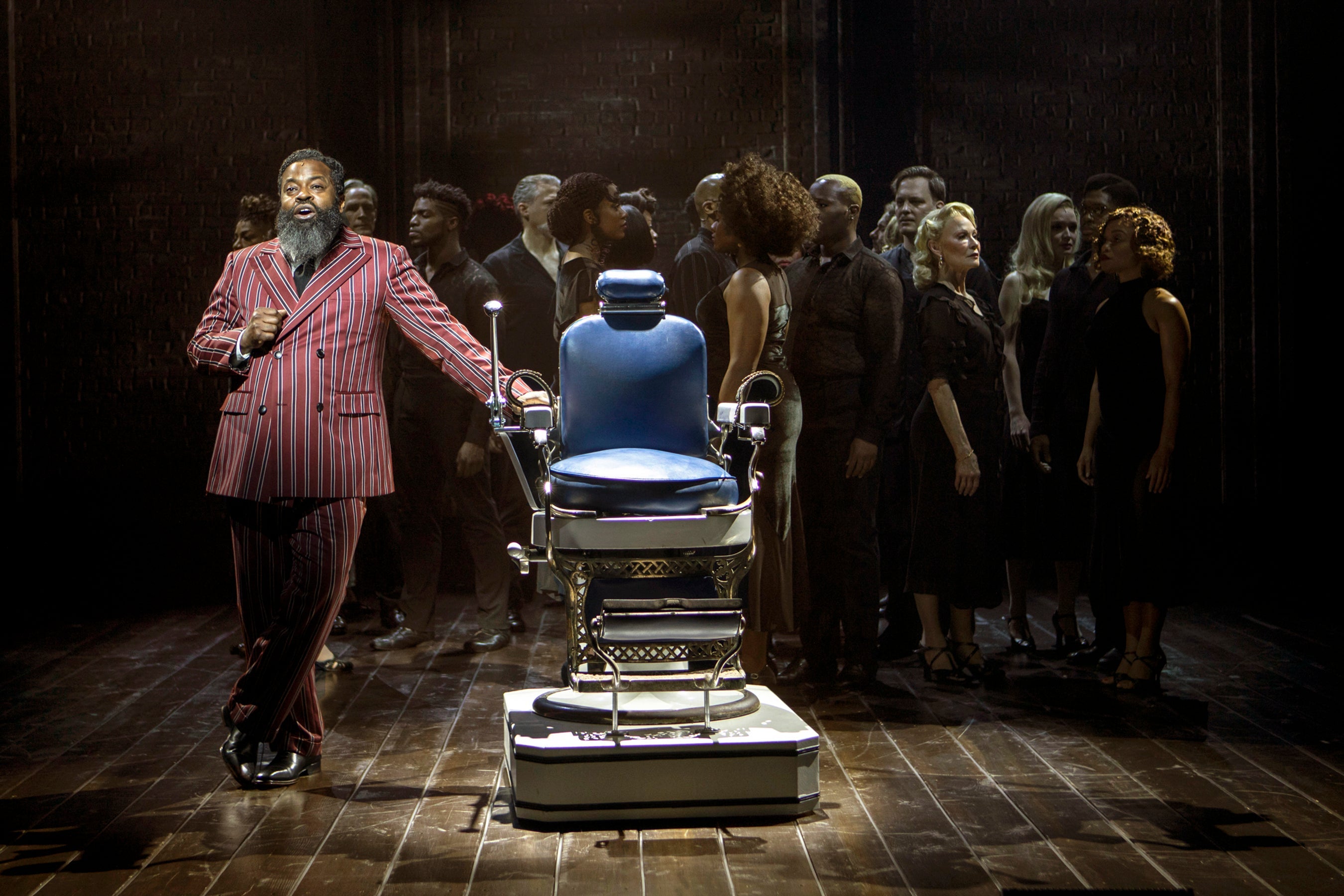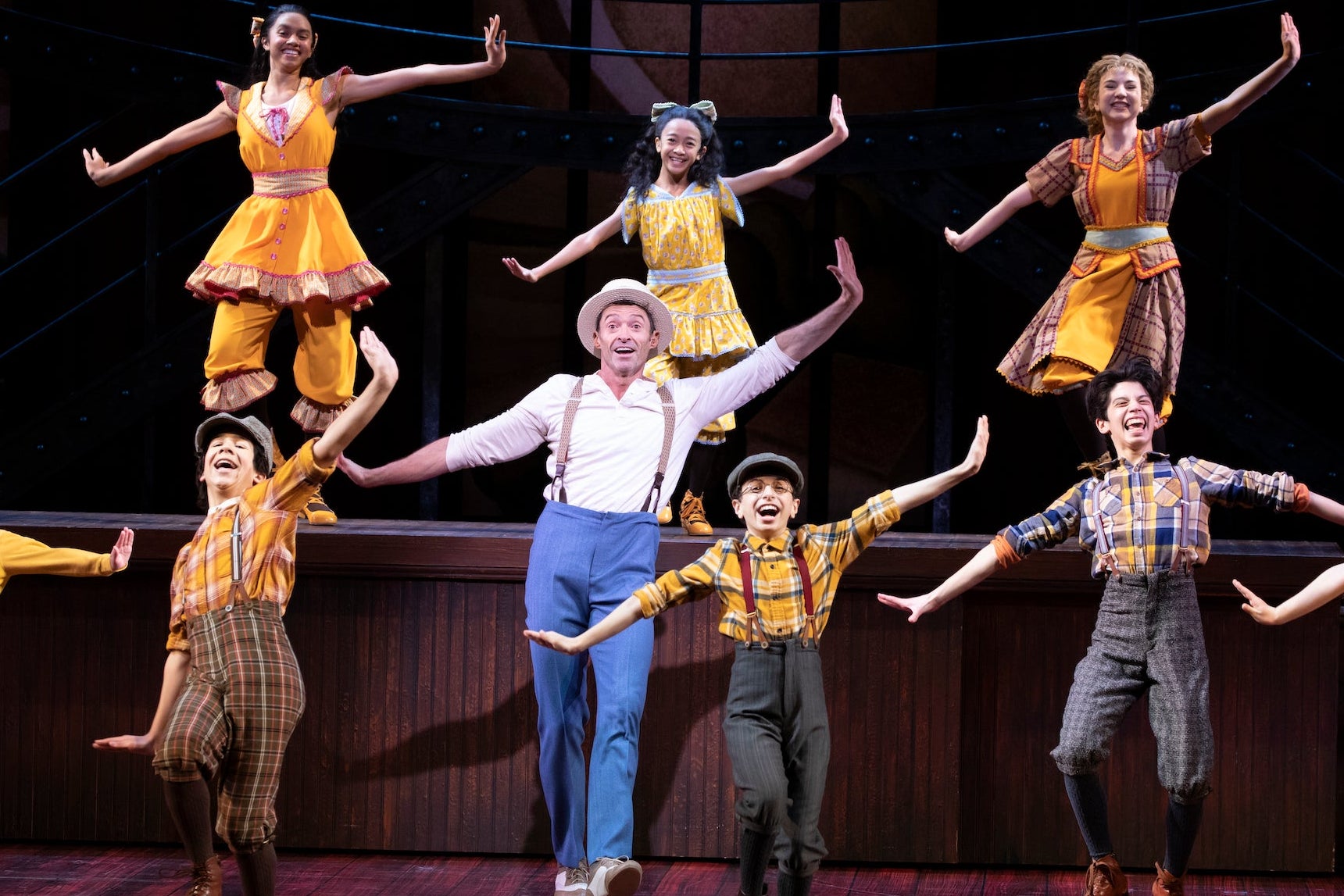Harold Hill, the smooth-talking, straw boater-wearing salesman currently incarnated by Hugh Jackman in Broadway’s luxe revival of The Music Man, steps off the train in rural Iowa with a suitcase full of marching-band instruments that no one wants to buy. Fortunately, at least for him, instruments aren’t really what he’s selling. The residents of small-town River City don’t have any use for trombones and clarinets, let alone the pricey uniforms required to transform a cacophonous passel of novice horn players into an actual band. But Harold isn’t preoccupied with serving people’s actual needs so much as discerning what they want, then figuring out how to make that desire so acute that it blots out everything else.
Harold Hill may not, as the traveling salesmen grumble in The Music Man’s opening number, “know the territory,” but he does know these people. (So did Meredith Willson, who wrote The Music Man based on his experiences growing up in Mason City, Iowa, in the early 20th century.) And it only takes one question—“What’s new around here?”—for him to figure out how to get these skeptical Midwesterners eating out of his hand. In his character-defining song “Ya Got Trouble,” Harold builds the novelty of the town’s recently acquired pool table into an existential threat to River City’s very way of life. Most of the upheavals with which he attempts to scare his future marks are comically picayune: the demise of horse-and-cart racing or the incursion of off-color slang, like the dreaded word “swell.” But in order to close the deal, he plays to an uglier, more deep-seated fear, one that makes a story set over a century ago feel suddenly up-to-the-minute. As his sales pitch takes on the fervor of a revival meeting, Harold paints a dire picture for the local parents: Pool halls, he warns, lead to drinking, gambling, smoking, and, eventually, to “your son, your daughter” being grabbed by “the arms of a jungle animal instinct,” all fueled by the “shameless” rhythms of ragtime music.
Audiences seeing The Music Man on Broadway in 1957, at the height of the moral panic over white children’s exposure to the corrupting force of Black rock ’n’ roll, wouldn’t have needed the subtext of Harold Hill’s homily spelled out for them. But in the new production, the offending phrases have simply been wiped away, part of a wave of changes aimed at adapting the 65-year-old show for contemporary viewers, some of whom have paid upward of $700 for their seats at the Winter Garden Theatre. The new version, directed by Broadway veteran Jerry Zaks, mercifully cuts the pageant in which the town’s residents dress up as racist caricatures of Native Americans, and thanks to new lyrics by Hairspray’s Marc Shaiman and Scott Wittman, the rousing singalong “Shipoopi” has been transformed from a jaunty endorsement of nonconsensual groping to an anthem in praise of men “who’ll wait till a girl says when.” But while “woke Shipoopi” has come in for a good ribbing, the changes to “Ya Got Trouble” have received scant notice, despite the fact that they fundamentally change what The Music Man is about. Instead of warning against “shameless” ragtime, Hugh Jackman’s Harold Hill cautions his crowd about “modern music;” “jungle animal instinct” has been swapped for “the depths of a syncopated frenzy.” Cutting the race-baiting from Harold’s signature song feels like an easy enough fix, but combined with the excision of a line branding the rambunctious teen Tommy Djilas—whose Serbian surname would have marked him as an ethnic other in 1912—for being the son of “one a’them day laborers south a’town,” the elision leaves a vacuum at the show’s center. Are the people of River City, a diverse bunch in this colorblind production, really that worked up about the encroachment of modernity? If Harold Hill isn’t selling lightly coded racial anxiety, what exactly is he selling?
When The Music Man was announced last year, some critics took issue with the revival, in part because Harold’s populist rhetoric sounded a little too close to Donald Trump’s. Even Robert Preston’s unmatchable performance, captured in the 1962 movie, plays a little differently now, his bottomless self-confidence and adopted workingman’s air taking on a vaguely sinister cast. But the changed context hasn’t added darkness to the role so much as it’s underlined what was already there. The scrubbed-down “Ya Got Trouble” still keeps Harold’s exhortation to “Remember the Maine, Plymouth Rock, and the golden rule”—a cozy appeal to nostalgia that folds in the slogan used to gin up the dubious claims that ushered the U.S. into the Spanish–American War.
Jackman, a lifelong song-and-dance man who recently took on the role of iconic American huckster P.T. Barnum, seemed like an ideal fit for Harold Hill, but most reviews have noted that there’s something a little off in his portrayal. The New York Times’ Jesse Green called Jackman’s turn “smart but strangely inward,” and Time Out’s Adam Feldman said he’s “too likeable to take seriously and too patently slick to be believed.” If there’s a quality missing from Jackman’s portrayal, it’s, in a word, Trumpiness. Jackman’s Harold is more a wooer than a rabble-rouser, dazzling the town’s skeptical librarian (Sutton Foster) and leading its children in a series of invigorating dance numbers that have been extended to let him and the show’s massive ensemble shine. But he never summons the revival-meeting fervor that “Ya Got Trouble” demands, and when he starts the anthemic “76 Trombones,” which is meant to hook River City on the solution that only he can provide, the lighting drops to a single spotlight. It’s as if he’s sharing a personal vision rather than delivering a calculated spiel to gullible rubes. When he’s finally caught out for misleading the townspeople about his ability to form their youths into an airtight musical ensemble, Jackman replies, dreamily, “I always think there’s a band.”
Americans love fictional con artists, because they take the ideal of the self-made man to its ultimate end—a person whose only product is their actual self—and split the world into two groups: those savvy enough to be wise to the con (i.e. us, just by virtue of being in the audience) and those dumb yahoos over there. As Edward Ballesein puts it in Fraud, his history of American flim-flammery: “American popular culture … has retained a soft spot for charismatic grifters and oily-tongued salesmen, evincing admiration for their audacity, ingenuity, and capacity to land on their feet. Social commentators have often paired this appreciation with disapproval of the suckers who proved incapable of resisting pitches that proved too good to be true.”
We flatter ourselves, though, when we divide the world into operators and marks, especially when we invariably identify with the former. In her book The Confidence Game, Maria Konnikova explains that intelligent people are actually more susceptible to some cons, because they’re so unaccustomed to doubting themselves. (Con artists themselves also make great marks.) Preston’s charismatic bellow seems impossible to resist, but that belies the fact that the most successful cons are the ones we’re convinced to pull on ourselves. “The true con artist doesn’t force us to do anything; he makes us complicit in our own undoing,” Konnikova writes. “We believe because we want to, not because anyone made us.” Harold Hill can’t sell what the people of River City aren’t already buying.

Declining to embody the uglier, Trumpier parts of Harold Hill doesn’t feel like a failure of Jackson’s performance so much as a refusal to dig in deeper, but the result is the same—a pallid, deracinated incarnation of a core American archetype. For a more truthful rendition on the American huckster, you have to head a few blocks southwest of the Winter Garden, where the New Group’s musical Black No More is playing at Signature Theater through Feb. 27. Inspired by George S. Schuyler’s 1931 novel, the musical was co-written by and stars the Roots’ Tariq Trotter as a Satanic tempter named Julius Crookman, the inventor of a machine that can turn Black people’s skin white. Like Harold Hill, Julius’ real selling point is the end of difference, but instead of riling up the townspeople against outsiders, he’s pitching the residents of 1920s Harlem a way to make everyone look the same. “I offer you a crowbar to free you from your racist box,” he tells Max Disher (Brandon Victor Dixon), a hustler who crows that he “can run the pool tables like I run the streets,” but still feels like “three-fifths of a man.” What’s striking about Julius Crookman’s pitch is how little hustle there is in it. He may spell out “vitiligo” the way Harold Hill does “trouble,” but he doesn’t need to put the fear into his potential customers—white supremacy has done that for him.
An ingrained contrarian who, as the historian John Henrik Clarke put it, “got up in the morning, waited to see which way the world was turning, then struck out in the opposite direction,” Schuyler used his novel to savage thinly veiled versions of Marcus Garvey, W.E.B. DuBois, James Weldon Johnson, and Madame C.J. Walker, all of whom are essentially running cons of their own. And while the musical is not so roundly cynical, it follows the novel’s arc, with a transformed Max dubbing himself Matthew Fisher and traveling south, eventually becoming the de facto leader of a Klan knockoff called the Knights of Nordica. (Ironically, Schuyler himself followed a similar arc, eventually becoming a member of the far-right John Birch Society and critic of the civil rights movement.) Max doesn’t seek out his fate, but he also doesn’t do much to avoid it. Meanwhile, Harlem virtually empties out as its residents rush to follow Max’s lead. Eventually, the Knights of Nordica come to their new leader with a problem: There aren’t enough Black people left to sustain a violent nationalist movement built around repressing them. Who do we hate next?
“Cons,” Konnikova writes in The Confidence Game, “thrive in times of transition and fast change, when new things are happening and old ways of looking at the world no longer suffice.” That goes for our own era as well as Julius Crookman’s and, yes, Harold Hill’s. In a moment of instability, Harold offers the people of River City a way to turn back the clock, and though he can’t deliver on his promise to teach their children how to play their shiny new instruments, he’s got something that turns out to be just as good. Like a turn-of-the century version of the law of attraction, his patented “think system” advises the children not to touch their instruments at all, and to simply imagine themselves playing instead. And the thing is … it works. They’re not magically transformed into virtuosos, but they’ve obtained what Harold was really selling: a sense of their own community—not just uniforms, but uniformity. The kids still can’t play a note, but it doesn’t matter, because they believe they might be able to someday. And at the Winter Garden Theatre, the audience bursts into applause, delighted that the fantasy has once again been proven real. Americans love nothing more than envisioning what we can be, especially if it allows us to avoid seeing what we are.
